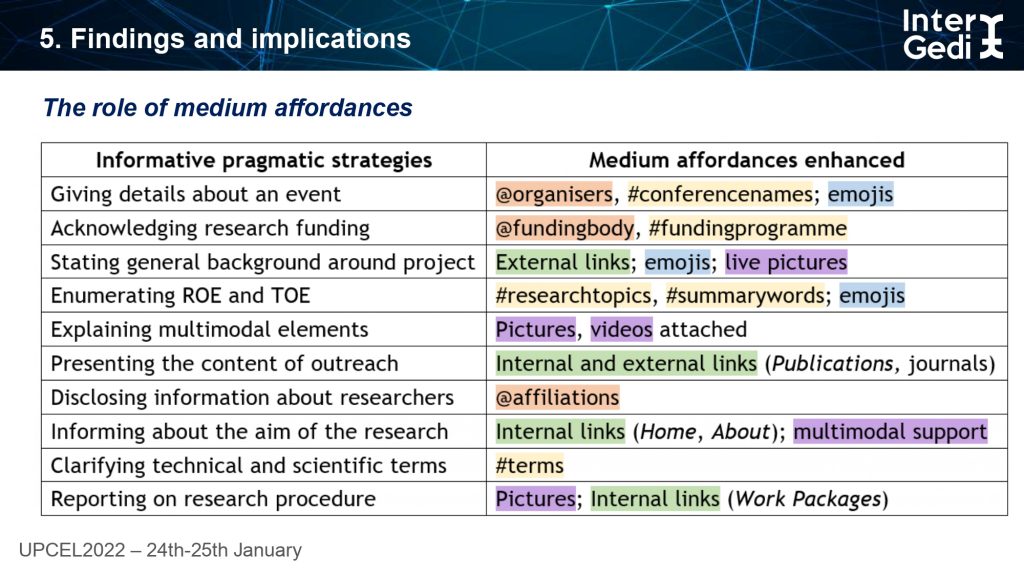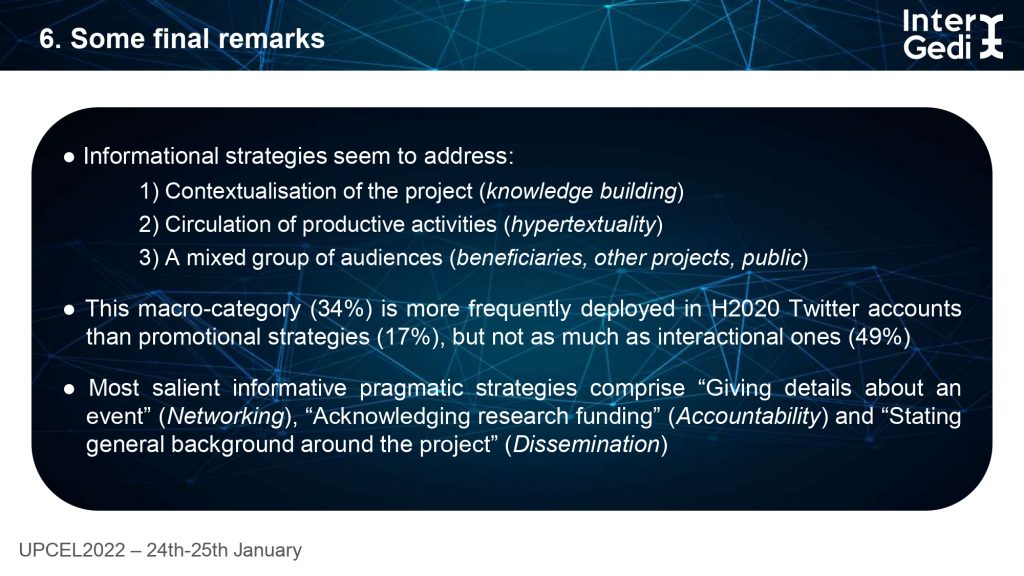UPCEL 2022: Daniel Pascual’s analysis on the use of strategies for dissemination of information through Twitter


Daniel Pascual delivered a paper at the at the conference UPCEL 2022 (4th International UCM Predoctoral Conference on English Linguistics), which took place during the 24th and 25th of January in the Universidad Complutense de Madrid. In his presentation he analyses the strategies used by academics for disseminating their research through the platform Twitter, and he does this by examining the practices present in the EUROPROtweets ready-made corpus. Thus, Pascual explores the implications that digital discursive practices in Twitter nowadays may have when designing linguistic guidelines in the communication of international research.
Below you can read the abstract submitted for the conference to have a fuller picture of Daniel Pascual’s communication.
Informative pragmatic strategies and salient medium affordances in the dissemination of international research through Twitter
Abstract
In the process of undertaking international research projects among various universities and institutions, one fundamental aspect to be considered lies in the dissemination of results and outlets from such projects. Relatedly, clear advantages are brought about by digital genres and platforms for scholars to increase the visibility and accessibility of their research (Mur-Dueñas 2018), and social networks stand out because of their ubiquity, immediacy and dialogicity. For scientific and academic purposes, Twitter is notably valued as a venue for researchers and professionals to communicate updates and achievements in their research agendas to a heterogeneous audience of both specialized and lay users. As regards international research projects, such potential not only helps popularize and circulate new knowledge stemming from their ongoing results and outcomes, but also contributes to increasing the interest of beneficiaries and stakeholders in their research, boosting the project impact and outreach. These actions comply with the mainstream trends of engaging the public through science communication (Bowater and Yeoman 2013).
As part of my PhD thesis focused on digital discursive practices developed by international research groups, in this presentation I seek to analyse, from a pragmatic perspective, the strategies they deploy in the dissemination of new information about their research projects through Twitter. In particular, informative strategies are explored into a ready-made corpus, the EUROPROtweets corpus, which consists of 20 Twitter accounts held by Horizon2020 research projects (34,450 tweets). These strategies, together with sets of promotional and interactional ones, make up a datadriven taxonomy geared towards the study of the intentions research groups have when communicating and spreading their scientific research. The NVivo 12 analysis software is used to code the pragmatic strategies and review them. In this study, quantitative data regarding the frequency and use of the 10 informative strategies identified as salient in the corpus is offered, and representative examples from original tweets are discussed to unveil such pragmatic intents. A wide use of various Twitter affordances is displayed in the instantiation of diverse informative strategies: hashtags/mentions in “Acknowledging research funding”, hyperlinks in “Stating general background around the project” or emojis in “Giving details about an event”. Other strategies, such as “Informing about the aim of research” and “Presenting the content of outreach”, primarily resort to linguistic resources to convey the intent of the research group and intersperse them with the addition of some Twitter affordances.
Overall, the present study identifies current digital discursive practices in Twitter used for research purposes by members of international projects through the analysis of informative pragmatic strategies. This may have significant implications in the way researchers express their communicative intents online and exploit the affordances of social media, and could help design linguistic guidelines of good practice in the communication of international research.
References
Bowater, Laura & Kay Yeoman. 2013. Science communication: A practical guide for scientists. Oxford: Wiley-Blackwell.
Mur-Dueñas, Pilar. 2018. Disseminating and constructing academic knowledge in online scholarly journals: An analysis of virtual special issue introductions. Discourse, Context & Media 24. 43–52.
